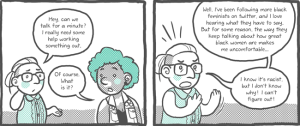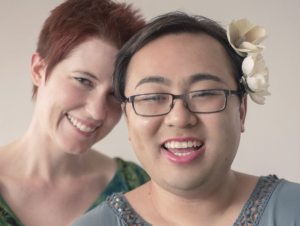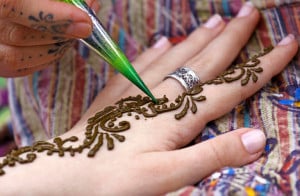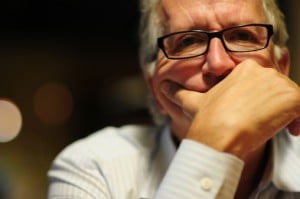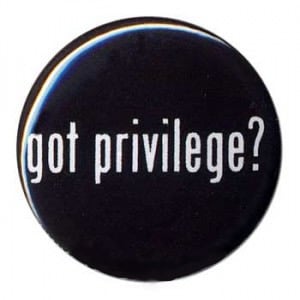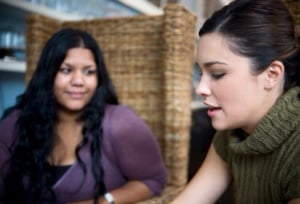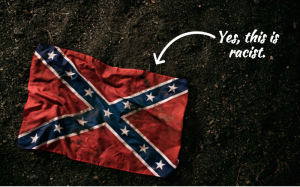
A person standing against a brick wall with a skeptical expression.
Today, as I drove my son to the barbershop, I decided to flip the radio from the news to an old school hip hop radio station. Immediately, Easy E began to blare. I don’t recall the name of the song, but it was a standard Easy track oozing bravado that revolved around viewing women as mere sexual objects for the male gaze.
I quickly changed the radio back to the news. My son questioned the sudden switch and I simply responded with, “Wrong message.”
Once upon a time, I was all about that wrong message. Long before my face sprouted a single whisker, my head was filled with all sorts of beliefs I assumed were absolute facts. I “knew” girls were play things. Worse, I “knew” Black girls were even less important than white girls.
You couldn’t tell me this wasn’t the case, even when I was young enough to still need a babysitter. I vividly recall one time my babysitter angrily chastising me for telling another, younger boy she took care of that “It’s okay to mess around with Black women, but you don’t marry them.”
How could a middle school aged boy be so invested in trivializing Black girls and women?
Perhaps it was cinematic examples like New Jack City’s Nino Brown nonchalantly pouring champagne on his weeping girlfriend and declaring, “Cancel that bitch, I’ll buy another one.” Or maybe it was songs like Ol’ Dirty Bastard’s “Dog Shit” that describes a woman with brown skin and weave and proceeds to tear her down with every foul name you could imagine.
Mix those kinds of cultural influences with the way blackness is dehumanized and femininity is constantly devalued and it concocts contempt reserved for Black women known as misogynoir. Misogynoir – a term coined by Black queer feminist scholar Moya Bailey – describes anti-black misogyny that uniquely targets Black women at the intersection of white supremacy, sexism, and racism.
Black men preserve misogynoir against Black women through misogyny and internalized racism that associates blackness with inferiority.
As a humanist, I believe in the virtue of human accountability and social responsibility to forsake behavior that harms others. As a Black man and father to a Black son, I feel a distinct obligation to abandon ways of thinking that specifically marginalizes Black women.
This article will introduce three ways Black men can step up for Black women and fight misogynoir.
But First, a Brief History Lesson: C.R.E.A.M.
In order to comprehend why something happens, it’s important to better understand its roots. In 1994, the Wu Tang Clan released the hip hop classic “C.R.E.A.M.” (“Cash Rules Everything Around Me”), a song that emphasizes rising above hardship, pursuing positive life alternative, and economic realism.
The legendary hip hop group was close, but even more than money, culture reigns sovereign – Culture Rules Everything Around Me.
When we are introduced to an idea that is repeated over an extended period of time through religion, art, music, media, and literature, it doesn’t matter if what’s being communicated is factual or propaganda.
Culture is a hell of a drug. Ideas expressed through the full range of learned human behavior stalk us like soft whispers we can’t resist.
Cultural messages that present men as whole human beings while regarding women as sexual objects and animals (subhuman) to be subdued by men is baked into our subconscious and infiltrates the development of our social attitudes.
These low opinions of women, femmes, and femininity are the foundation of misogyny. Misogyny propels sexism. In fact, misogyny is the backbone of sexism.
Misogynist customs are seen thriving on a social and cultural level throughout the ancient world in mythology, dominant world religions, and philosophy.
Women and the feminine are depicted as surrogates of “sin” and error in Greek (Pandora, first woman, viewed as a “beautiful evil” in Theogony) and Biblical (Eve, first woman, blamed for “the fall of man” in Genesis) myths. Tertullian, founder of Latin Christianity and Western theology, regarded women as “a temple built over a sewer” while Aristotle, one of the most influential philosophers of all time, considered them inferior and deformities.
These widely shared ancient prejudices have been consumed and reproduced generation after generation, all the way to modern times. They form the foundation of ideas that birthed religious, political, social, and sexual hostility towards women.
It’s misogyny that tells us men that women are disposable items that exist for abuse or our gratification. It’s misogyny that degrades the very existence of women.
It’s misogyny that condones honor killings. It’s misogyny that allows for double standards in the way we excuse certain behavior by men that we consider improper or unacceptable when perpetrated by women.
Our complicity with these beliefs reveals itself in how we sing along to songs like “Dis Bitch, Dat Hoe” by Triple 6 Mafia without batting an eye and congratulating men that “dog” women by having multiple partners while finding the very idea of a promiscuous woman repulsive.
But that’s not all.
Another value system conditioned through an established history of social culture is anti-blackness. Anti-blackness involves cultural messages that declare whiteness is ideal while stigmatizing and undermining the value of blackness.
Lincoln may have begrudgingly freed the slaves, but unlike the Emancipation Proclamation, there was never an edict or memo issued that walked back the idea of Blacks as being subhuman, living tools. Further, whites (along with the freed slaves) never underwent a comprehensive instruction process that corrected beliefs that contribute to the indifference to Black suffering.
While chattel slavery was toppled, the tradition of white supremacy and denigration of blackness was never abolished. Education, news, literature, and now debunked scientific proofs all proliferated the notion of Black inferiority and depravity.
Since the passage of time doesn’t erase the influence of these dominant stories, the debasement of Black humanity continues today and infests the way we interpret the world and form values.
Here’s why these two unique histories of marginalization matters: Identities coexist.
I am a cisgender, heterosexual, Black, able-bodied, educated, lower middle-class, atheist man. None of these subsets of being exist independently. I am all of these things simultaneously. The same goes for the routine of various kinds of social oppression that’s carried out on a daily basis.
Black women are subject to the legacy of anti-blackness and misogyny in concert. They endure racialized sexism and sexist racism. These two planes of oppression envelope and create anti-black misogyny – or misogynoir.
I believe it is the job of Black men to rid our actions and consciousness of misogynoir before harming any more Black women; here are three ways we can begin the process of doing just that.
1. Self-Education
The first step Black men must take in fighting misogynoir is engaging in self-education. Many men may not realize it but women and femmes are constantly subjected to emotional labor, especially when it comes to expending energy correcting us or explaining things to us. We should show initiative in achieving greater social consciousness.
Self-education means we make an active and consistent effort to learn from Black women indirectly. This means dedicating time to listening to them share their lived experiences.
Rather than taking up space or contributing to emotional labor, this looks like following those vocal about their lived truth as a Black women represented in published literature, essays, blogs, and social media.
Let what’s exposed and called-out marinate. Hold back that urge to comment or enter the space that isn’t meant for your opinions. Embrace and sit with that frustration or defensiveness or feelings of being misrepresented or left out.
I’m able to describe these emotions so well because I’ve been there. I know how badly you’ll want to jump in and interrogate or argue (derail) or discredit the stress-inducing content. Don’t. Just listen. Keep going back.
Keep in mind these spaces don’t exist to cater to your expectations or ego. Immerse yourself in the work of Black women speaking out against mistreatment surgically reserved for them. This simple, deliberate act goes a long way to chipping away at negative beliefs you harbor for Black women.
2. Self-Inventory
Okay, so we’ve got the ball rolling and we’re looking to educate ourselves. Along with a desire to learn comes willingness to plunge deeper and question ideas we have long taken for granted. For us Black men, that means examining our internalized racism and misogynist assumptions about Black women.
It should come as no shock that the influence of racism extends to the way Black folks view themselves and each other. This obviously includes Black men. We aren’t magically inoculated against this form of hatred.
Similar to the way women and femmes experience internalized misogyny, Blacks are continually bombarded with so many anti-black messages that it leads to self-contempt. If we aren’t vigilant, in unawareness we will express preferences in subtle or even unconscious ways that hold whiteness in higher esteem at the expense of blackness.
The haunt of internalized racism spoils our priorities as Black men. Internalized racism factors into how we regard and prioritize blackness and births respectability politics.
Team this with misogyny and it produces misogynoir, a prejudice overly critical of the bodies, behavior, and mere presence of Black women. As evidence of this we need look no further than the way we ignored Joyce Quaweay, victim-blamed Korryn Gaines, and shamed Atlanta teacher Patrice Brown, known better as #teacherbae.
Even the movement for Black lives isn’t immune to misogynoir.
We talk about the importance of Black Lives Matter and will protest on behalf of those victimized by a white supremacist “law and order” system. We readily point to names like Trayvon Martin, Michael Brown, Eric Garner, and Tamir Rice. We know their stories.
But how many names and stories of Black girls and women obliterated by police brutality can you recite without looking them up?
You will likely have difficulty answering with the same level of recall or passion, and that’s why the #SayHerName movement exists. Rarely are we able to escape the bias of a male-dominated society, even when we’re struggling for justice. This is why a critical step in confronting misogynoir is self-inventory.
As Black men existing in a white supremacist, male-centered culture, it’s imperative we approach the mirror and take a deep look at ourselves. You must check yourself. You likely entertain, encourage, or engage in misogynoir ideology. Not necessarily because you seek it out, but because you’ve undergone lifelong psychological messaging that looks down upon blackness and femininity.
Self-hatred is real. Don’t allow it to go unchecked because it has the potential to be passed on in your interactions with Black women. Once you begin to conquer all the lies you have internalized about yourself and others, the easier it is to recognize and avoid deception bound to those cultural messages.
3. Step Up
Self-education and self-inventory grant us the critical thinking tools necessary to self-correct our mental and emotional allegiance to misogynoir principles. This is vital, because the last step needed for a paradigm shift is challenging other Black men on misogynoir.
This is where our voices and presence can be the most beneficial. Introspection should lead to the inspection of misogynoir displayed by other Black men.
I know this is difficult to consider and visualize. You’re probably thinking of certain friends, family, or co-workers who have said some pretty disgusting things about Black women. Though this may be intimidating, it’s crucial to combat the ways we normalize the disparagement of Black women – and that includes our silence, which is tantamount to complicity.
Attitudes aren’t static. They can be honed and changed. The thing is, attitude adjustments never occur arbitrarily. Rather, people are motivated to change. This is where you come in.
Be that motivation for other Black men by using forethought and mustering up courage to “go against the grain.”
A good place to start would be asking basic questions like, “Why would you say that?” or “What do you mean?” when you hear misogynoir comments. Asking simple questions like these stimulate critical thinking and draw out underlying presumptions involved in misogynoir beliefs. Let it be known that you don’t think that way about Black women.
Also, consider some of the ways Black men already step up – and contrast it with occasions where we don’t. This can serve as another way for you and others you challenge to think more extensively about the type of beliefs we condone and condemn.
When Blacks are marginalized in such a way that Black men are or can be perceived as the center of attention, we’re all over it. Racial profiling? Police brutality? Damn right, we cry foul, rely heavily on personal experiences, and demand justice.
But when Black women decry the ways in which they’re brutalized by Black men, oftentimes for matters that ought to be innocuous like telling us “no” (Janese Jackson Talton), or not thanking us for holding a door open (Lakeeya Walker)… then we become defensive, or downplay, or find ways to distance ourselves from any association from these matters.
When Hollywood does what it does best and resorts to racist and white savior narratives, we’re front and center to blast this fuckery because we realize it to be harmful. But when Black women point out how media like the film Hustle and Flow embodies the depravity of misogynoir, it’s rationalized or trivialized without consequence.
Funny how much our excuses and avoidance tactics resemble white fragility within white folks refusing to accept they play a role in an ecosystem that privileges them over people of color.
We must step up.
A species of race consciousness that lacks a misogynoir-inclusive social consciousness lens is incomplete. It’s half-woke. How can you be pro-black if you don’t take the peril of Black women seriously?
Black men have a responsibility to both validate and oppose the reality of misogynoir in the same way white folks must validate the existence of white supremacy and mobilize against anti-black racism.
Why? Because there is no progress without confrontation.
Rather than allowing misogynoir to continue through your silence, speak up. By not allowing it to go unchallenged, you take a significant step in reducing its acceptability in the world.
***
Black men, it’s time we step up in real ways for Black women. This is a call for us to examine cultural narratives that distinctly put down Black women. Let’s take ownership and take action to dismantle our part in perpetuating this oppression.
What’s needed is straightforward. Self-education – listen to and glean from the knowledge and experiences shared by Black women. Self-inventory – carefully deconstruct your beliefs about Black women while bearing in mind the vast scope of anti-blackness and misogyny present in our daily life. Call-outs upset the status quo by making those sharing misogynoir views uncomfortable.
Liberation from misogynoir can’t be won through inaction or lip service. It may sound cliché but it’s true: If we aren’t a part of the solution, we are part of the problem.
Where do you stand?
[do_widget id=’text-101′]
Sincere Kirabo is a Contributing Writer for Everyday Feminism and is a writer, activist, and the Social Justice Coordinator with the American Humanist Association. He’s a self-described philosophile with a high regard for Sikivu Hutchinson, Kimberlé Crenshaw, Shirley Chisholm, and James Baldwin. When he isn’t writing, Sincere enjoys road trips, trying to beat Super Mario Bros with his son, and learning about history. Sincere’s work can also be found on The Humanist and Patheos. Follow him on Twitter @sinkirabo.
Search our 3000+ articles!
Read our articles about:
Our online racial justice training
Used by hundreds of universities, non-profits, and businesses.
Click to learn more
Most Read Articles
- « Previous
- 1
- …
- 30
- 31
- 32







